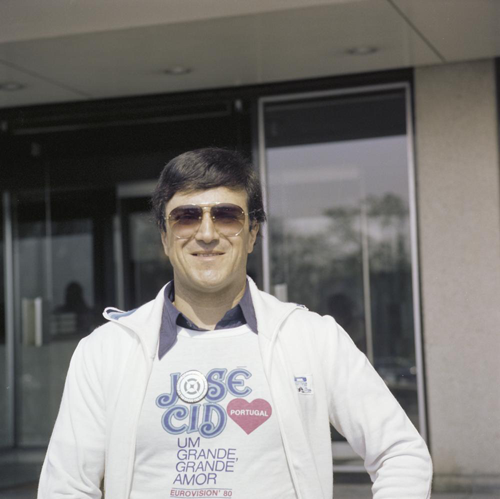|
Antes Do Adeus
Portugal participated in the Eurovision Song Contest 1997 in Dublin. Célia Lawson represented Portugal with the song "Antes do adeus". Before Eurovision Festival da Canção 1997 Festival da Canção 1997 was the 34th edition of the festival, and was used to select the 33rd Portuguese entry at the Eurovision Song Contest. Final Before the final there were 5 semi-finals, which televoting selected one song from each semi-final to qualify for the final. The final was held at the Coliseu dos Recreios in Lisbon on 7 March 1997, hosted by António Sala and Cristina Caras Lindas. Eight songs competed in the final, with the winner selected by 20 regional juries and a 21st jury made up of televoting results, which was won by Os Meninos da Sacristia. The winner was Célia Lawson with "Antes do adeus". At Eurovision Heading into the final of the contest, RTÉ reported that bookmakers ranked the entry 15th out of the 25 entries. In Dublin, Portugal scored 0 points placing last 24 ... [...More Info...] [...Related Items...] OR: [Wikipedia] [Google] [Baidu] |
Dublin
Dublin (; , or ) is the capital and largest city of Republic of Ireland, Ireland. On a bay at the mouth of the River Liffey, it is in the Provinces of Ireland, province of Leinster, bordered on the south by the Dublin Mountains, a part of the Wicklow Mountains range. At the 2016 census of Ireland, 2016 census it had a population of 1,173,179, while the preliminary results of the 2022 census of Ireland, 2022 census recorded that County Dublin as a whole had a population of 1,450,701, and that the population of the Greater Dublin Area was over 2 million, or roughly 40% of the Republic of Ireland's total population. A settlement was established in the area by the Gaels during or before the 7th century, followed by the Vikings. As the Kings of Dublin, Kingdom of Dublin grew, it became Ireland's principal settlement by the 12th century Anglo-Norman invasion of Ireland. The city expanded rapidly from the 17th century and was briefly the second largest in the British Empire and sixt ... [...More Info...] [...Related Items...] OR: [Wikipedia] [Google] [Baidu] |
Coliseu Dos Recreios
The Coliseu dos Recreios (also known as Coliseu de Lisboa) is a multi-purpose auditorium located in Lisbon, Portugal. History The main building was constructed within a metal lattice by Francisco Goulard between 1888 and 1890. While the facade was completed by Cesare Ianz. The building was inaugurated on 14 August 1890. In 1897 the ''Geographical Society of Lisbon (')'' occupied part of the spaces, inaugurating the ''Portuguese Hall (')'', authored by architect José Luís Monteiro (1849-1942) shortly after. António Santos Júnior became director general of the Coliseu dos Recreios in the same year. On the death of António Santos (1920), the direction of the Coliseu was assumed by Ricardo Covões. A major refurbishment of the installations was completed in February 1994, that included remodelling of the hall and stage, and reconstruction of the surrounding spaces. On 22 August 2006, the Coliseu (owing to its stylistic, typological and historic importance) was designated for ... [...More Info...] [...Related Items...] OR: [Wikipedia] [Google] [Baidu] |
Lisbon
Lisbon (; pt, Lisboa ) is the capital and largest city of Portugal, with an estimated population of 544,851 within its administrative limits in an area of 100.05 km2. Grande Lisboa, Lisbon's urban area extends beyond the city's administrative limits with a population of around 2.7 million people, being the List of urban areas of the European Union, 11th-most populous urban area in the European Union.Demographia: World Urban Areas - demographia.com, 06.2021 About 3 million people live in the Lisbon metropolitan area, making it the third largest metropolitan area in the Iberian Peninsula, after Madrid and Barcelona. It represents approximately 27% of the country's population. [...More Info...] [...Related Items...] OR: [Wikipedia] [Google] [Baidu] |
José Cid
José Albano Cid de Ferreira Tavares (born 4 February 1942) is a Portuguese singer, composer and record producer. Internationally, Cid is best known for his 1978 progressive rock album'' 10,000 Anos Depois Entre Vénus e Marte'' and for representing Portugal at the Eurovision Song Contest 1980 with the song "Um grande, grande amor". With a career spanning more than 60 years, Cid has been awarded 25 Silver, eight Gold and three Platinum records in Portugal. In 2019, Cid received a Latin Grammy Lifetime Achievement Award, becoming the second Portuguese singer, after Carlos do Carmo, to receive the honour. Early life Cid was born in 1942 in Chamusca, son of Francisco Albano Coutinho Ferreira and Fernanda Tavares Salter Cid Ferreira Gameiro. At age 6, he moved with his family to the municipality of Anadia. His professional career began when he started a covers band called ''Os Babies'' ("The Babies"), in 1956. In 1960, Cid began Law School at the University of Coimbra (FDUC ... [...More Info...] [...Related Items...] OR: [Wikipedia] [Google] [Baidu] |
Rosa Lobato De Faria
Rosa Lobato de Faria (, Rosa Maria de Bettencourt Rodrigues Lobato de Faria; 20 April 1932, Lisbon, Portugal – 2 February 2010, Lisbon) was a Portuguese actress and writer whose career encompassed a variety of media including acting, scriptwriting, literature (novels and poetry) and songwriting. She was a respected figure in Portuguese cultural circles.Obituary and career overview – Publico20 (Portuguese) She was married twice. Her first marriage, which produced three children, ended in divorce. Career Lobato de Faria came to acting relatively late, with her first major credit in a 1982 TV series ''Vila Faia'', which ran for 100 episodes. Between then and her last role in ''Aqui Não Há Quem Viva'' (2006–2008), she appeared in leading roles in many other telev ...[...More Info...] [...Related Items...] OR: [Wikipedia] [Google] [Baidu] |
Portugal In The Eurovision Song Contest
Portugal has participated in the Eurovision Song Contest 53 times since its debut at the 1964 contest. Since then it has missed five contests (, , , and ). The contest is broadcast in Portugal by Rádio e Televisão de Portugal (RTP). Portugal won the contest for the first time in and hosted the contest in Lisbon. Portugal finished last on its debut in 1964 and again in , before achieving its best result of the 20th century in , with Lúcia Moniz finishing sixth. The country then finished last for the third time in . Having not appeared in the final since and as holders of the record for most appearances in the contest without a win, Portugal won at the 49th attempt, when Salvador Sobral won the 2017 contest with the song "", Portugal's first top-five result in the contest. As hosts in 2018, the country finished last in the contest for a fourth time. History Portugal's debut entry was António Calvário with "". It was not a successful debut for the country, with Calvário ... [...More Info...] [...Related Items...] OR: [Wikipedia] [Google] [Baidu] |
Countries In The Eurovision Song Contest 1997
A country is a distinct part of the world, such as a state, nation, or other political entity. It may be a sovereign state or make up one part of a larger state. For example, the country of Japan is an independent, sovereign state, while the country of Wales is a component of a multi-part sovereign state, the United Kingdom. A country may be a historically sovereign area (such as Korea), a currently sovereign territory with a unified government (such as Senegal), or a non-sovereign geographic region associated with certain distinct political, ethnic, or cultural characteristics (such as the Basque Country). The definition and usage of the word "country" is flexible and has changed over time. '' The Economist'' wrote in 2010 that "any attempt to find a clear definition of a country soon runs into a thicket of exceptions and anomalies." Most sovereign states, but not all countries, are members of the United Nations. The largest country by area is Russia, while the ... [...More Info...] [...Related Items...] OR: [Wikipedia] [Google] [Baidu] |

.png)



